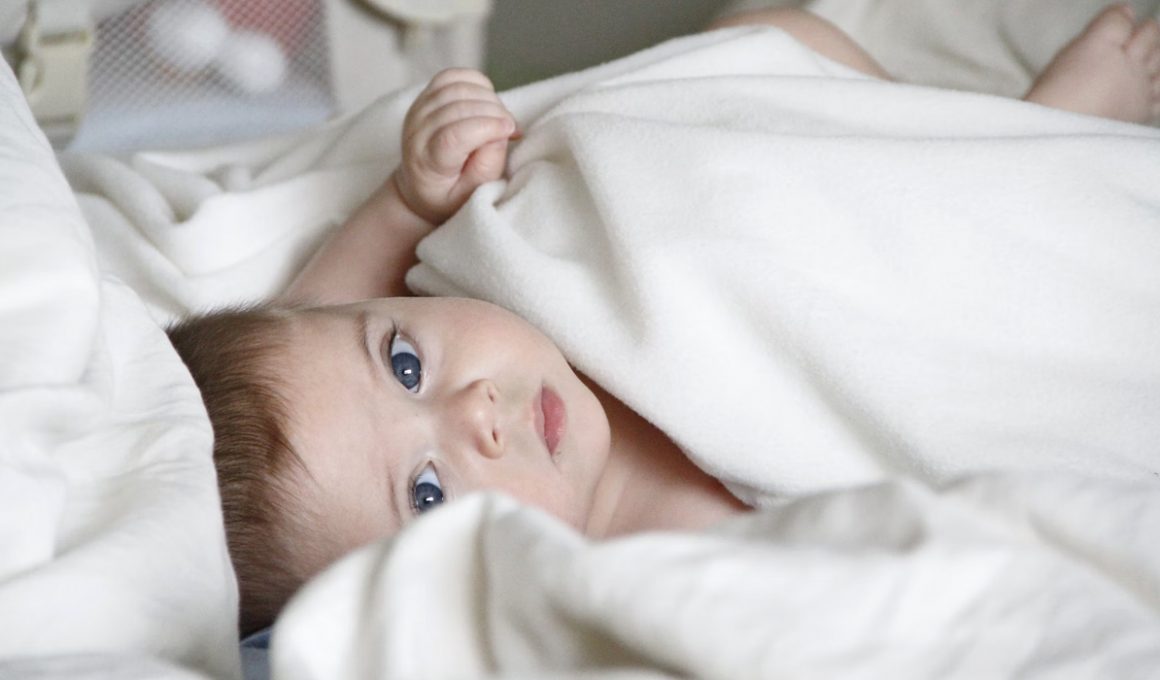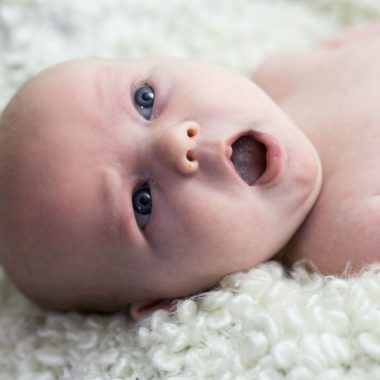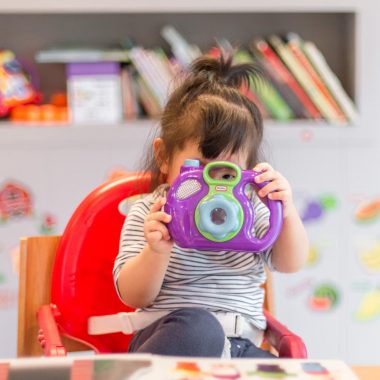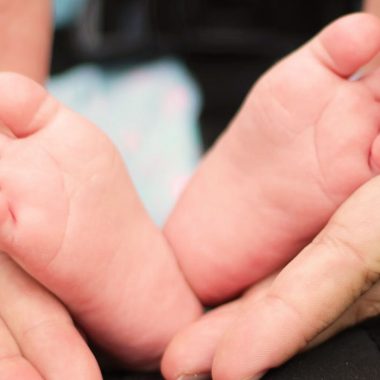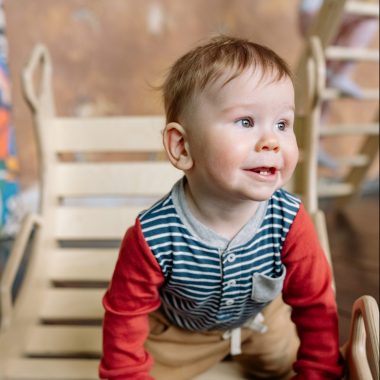Newborns spend their first week after birth adapting to their new world, which is very different from the womb.
In the womb, the temperature remains constant, light is dim, and noise remains muffled. After birth, all the conditions the baby is used to change. So you have to help your tiny newborn adjust to their new environment.
During the first week, your newborn is trying to
- Get used to the world outside the mother’s womb.
- Learn how to feed (either by breastfeeding or formula feeding)
- Sleep in the new environment
- Feel safe and secure
Please keep in mind that lots of love, attention, smiles, and cuddles are what newborns need.
Table of Contents
- What does a one-week newborn look like?
- One-week-old newborn movements
- Weight of a one-week-old baby
- Vision of a one-week-old baby
- Sleep of a one-week-old baby
- Feeding a one-week-old baby
- Crying in the first week of life
- Communicating with a one-week-old baby
- Common health concerns in the first week of life
- One-week-old baby’s pediatric visit
- Umbilical cord care
- Your newborn’s first week summarized
What does a one-week newborn look like?
The first week of your newborn is crucial. They go through several changes very quickly. You can expect to see some major changes in your newborn’s appearance.
- The shape of your newborn’s head, which can be a bit cone-like due to the journey through the womb, will start getting rounder and achieve a more normal shape.
- Any swelling around your newborn’s face and eyes will diminish in a few days.
- If your newborn’s face or head has been bruised due to, for instance, birth using forceps, the bruising will disappear. (If the effects of birth don’t disappear in the first week, you should inform your doctor.)
- The umbilical cord dries up gradually, darkens in color, and falls off eventually. This usually happens in 10 days’ time. Please keep the umbilical cord and surrounding area dry and clean. If the area around the umbilical cord becomes sticky and red, you should definitely contact your doctor.
- Your baby may have one or more birthmarks at birth or later. Birthmarks are common and usually do not require any medical attention. But if you have any questions in mind about your baby’s birthmark or marks, contact your doctor.
ALSO READ: Neonatal Jaundice – Types, Symptoms, Causes and Treatment
One-week-old newborn movements
Much of your newborn’s movement depends on reflexes, i.e. involuntary movements. Your newborn baby doesn’t make these movements purposely.
These early reflexes gradually disappear as the baby matures, usually around 3-6 months.
Reflexes, generally gross motor movements of a healthy newborn, are:
- Rooting reflex – your baby will turn their head or open their mouth when the area around the mouth is touched or stroked
- Suck reflex – this reflex is initiated when the roof of your baby’s mouth is touched. This reflex begins developing around the 32nd week of pregnancy and reaches full development around 36 weeks. This is why prematurely born babies have a weaker suck reflex.
- Moro reflex OR Startle reflex – this reflex is in response to a loud movement or noise. Your baby will respond by throwing their head back, extending their limbs and drawing them in as well as crying out loud.
- Tonic neck reflex OR Fencing reflex – one of the earliest primitive reflexes, it begins developing around 18 weeks of conception and the associated movements are visible until about 5-7 months of age. This reflex occurs when your baby is lying down flat and turn their head right or left – the corresponding arm extends in that direction while the other arm bends next to their head. This position is akin to the Fencing pose and that’s where the reflex gets its name.
- Grasp reflex – this is the reflex that involves your baby wrapping their little hand around your finger or any object placed in their palm.
- Stepping reflex – this reflex kicks in when your baby is held upright. Their legs will make movements mimicking walking or dancing. This reflex prepares your baby to start walking a few months later.
- Babinski reflex – this reflex occurs when the sole of your baby’s feet are stroked. Their foot will arch backwards and the big toe will extend upwards towards the upper surface of the foot. This is called a positive response. The negative response to the Babinski reflex occurs when the foot arches inwards and the big toe extends downwards towards the sole.
There are some easy ways to test if your baby has full reflex capacities. You can test this by:
- Touch the chin or the mouth of your baby when feeding. You’ll notice that your baby attempt to locate the mother’s breast or the nipple of the bottle (Rooting reflex)
- Place the nipple of the feeding bottle or your finger in the baby’s mouth making sure to make contact with the roof of the mouth. Your baby will begin to suck (Sucking reflex).
Weight of a one-week-old baby
During the first week of life, a newborn baby is still trying to learn how to feed. It is a new process and experience for your baby. It would be unreasonable to expect it to go smoothly from the get-go.
While gaining weight is incredibly important when measuring a baby’s growth, it is rare to observe weight gain within the first week.
In fact, a baby loses almost 10 percent of their birth weight during the first few days after birth.
Why? That’s because babies are born with extra fluid in their system. After both, they lose that fluid.
This directly translates into weight loss for the baby. You should not be alarmed by this change on the scale.
After a short adjustment period, your baby will begin to gain weight. After about 10 to 14 days, you can expect your baby to reach their birth weight again.
ALSO READ: Does My Baby Have Special Needs?
Vision of a one-week-old baby
A newborn baby’s vision is not clear. It is blurry and remains so for the first few days. Your baby can only see things held close to their face, say about 8-12 inches. This distance allows them to see and make out their parents’ faces.
That usually means your baby can see you if you hold them in your arms.
A little-known fact to new parents is that a newborn’s eyes are sensitive to bright light. If you notice that your baby’s eyes sometimes cross or drift outward, do not be alarmed. This is normal until your baby’s vision improves and their eye muscles strengthen.
Sleep of a one-week-old baby
Usually, a newborn baby sleeps a lot in the first week. You can expect your baby to sleep almost 17 hours a day while waking up every few hours to feed.
Newborns can’t sleep through the night. Since they have little tummies, they must wake up and feed often.
In fact, the life of a newborn during the first week is based upon two major factors:
- Feeding
- Sleeping
When your newborn sleeps, make sure to take all necessary security precautions. These include:
- Your baby should sleep in their crib or bassinet
- Do not put anything else in the bassinet e.g. toys, pillows, blankets
- Ensure your baby always sleeps on their back and not on their stomach or side.
ALSO READ: Toddler Cough Causes, Care and Remedies
Feeding a one-week-old baby
Most newborns feed every 2-4 hours.
In 24 hours, they usually have 8-12 feeds.
The key to feeding a one-week-old baby is not to have any expectations. The first week is an important period of adaptation for your newborn.
During this period, your baby will still be learning how to feed. So there can’t be a constant feeding schedule to follow.
The frequency of the feedings changes based on the way your baby feeds.
Breastfed babies feed quite often, perhaps every hour, in the first week. So feed your baby as often and as long as they want.
In the next few days, you will notice that your baby will start feeding lesser but for longer periods. Although the frequency of feeds will reduce, the duration of each feed will lengthen.
If your baby is formula fed, you can start by offering your baby 1-2 ounces of infant formula every 2-3 hours. If your baby shows signs of hunger, consult your doctor about increasing the dosage or frequency.
Most formula-fed newborns feed 8-12 times a day.
The easiest way to tell if your baby is full is by counting the number of wet diapers you have on hand.
- Day 1: A newborn baby only pees once during the first 12-24 hours.
- Day 2: The mother’s breasts get fuller as milk production increases. You can expect at least 2 wet diapers.
- Days 3-5: You should expect between 3 to 5 wet diapers during the third, fourth, and fifth days.
- Day 6 and later: Starting from the 6th day, your baby will be wetting 6-8 diapers daily. This number is not fixed and can sometimes go higher. Some babies wet their diapers after every feeding session.
Crying in the first week of life
Newborns cry. It’s normal. It’s their sole means of communication.
In the beginning, you might panic and lose your calm. It’s normal for a new parent to be overwhelmed with the parenting journey, especially in the first week.
You must remember that it is a process for you, your baby, and your family. It is alright not to know everything from the get-go.
Some of the main reasons your newborn will cry are:
- hunger
- hot or cold environment
- wet or dirty diapers
- feelings of insecurity
- needing a sense of safety
- being overstimulated
You will better understand your newborn’s crying patterns and habits with time. This will allow you to determine the reason behind your baby’s tears.
There are plenty of tools to help you with this process, too. Invidyo’s Baby Monitor provides Cry Detection and Analysis to help you better understand your baby’s crying habits and the causes behind the tears.
When your newborn baby cries, more often than not, the leading reason is that they need a diaper change. If that is not the case, you can try feeding, cuddling, speaking, singing, or rocking them instead.
ALSO READ: Baby Teething Symptoms, Care and Remedies
Communicating with a one-week-old baby
During the first one-week period, you and your baby are beginning to get to know each other. Both of you are learning to be comfortable around one another and picking up on the other’s cues and body language.
The baby already knows your voice and smell. And you will pick up on your baby’s body language and cues as time passes.
During this period:
- Communicate with your baby using your voice – speak and sing to them
- Use gentle physical touch
- Look directly into your baby’s eyes when holding them
- Cuddle your baby
- Smile at your baby while maintaining eye contact
- Apply skin-to-skin contact to make your baby feel safe and secure
Attachment parenting and secure bonding depend on meeting the needs of your baby from the very start. It is important for parents to exhibit love, warmth, attention, and compassion when interacting with their newborn baby. These are vital elements in every baby’s development and largely impact brain development.
Common health concerns in the first week of life
Some common health concerns that may arise during the first week of life are sticky eyes, weight loss, rashes, and blocked tear ducts.
Weight loss
It’s normal for a newborn baby to lose weight in the first week after birth. This is usually due to the loss of excess fluid.
This weight loss shouldn’t be more than 10% of the birth weight. Most newborns regain their birth weight in 1-2 weeks.
Rashes
Newborns can develop rashes, which are usually not serious.
Common rashes include cradle cap, heat rash, eczema, dry skin, and nappy rash.
Eye problems
Sticky eyes and blocked tear ducts are common in newborns.
It’s best to have your doctor check your baby’s eyes. Usually, gentle eye cleansing and massages help.
When to seek medical help
If something doesn’t seem right or you are worried about your newborn, seek medical help. It is always better to be safe than sorry.
You should seek medical help immediately if you notice that your newborn
- isn’t feeding
- has fewer than 6-8 wet diapers per day
- seems lethargic, irritable, or very tired
- can’t be woken up for feeding
- has pale or yellow skin
One-week-old baby’s pediatric visit
It is important to schedule an appointment with your pediatrician after one-week of birth. This check-up is crucial for the mama and the baby. It must not be skipped.
During this visit, the doctor will
- Weigh your baby
- Measure your baby’s height
- Conduct a general medical examination of your baby
This visit is a great chance to ask any queries, concerns, or worries you might have on your mind regarding your baby. You can ask your doctor about:
- Infant nutrition
- Sleep
- Growth
- Development
- Scheduling vaccinations
ALSO READ: When Do Babies Crawl?
Umbilical cord care
When your baby is born, the umbilical cord, which was the life support to your baby during pregnancy, is severed. In its place, a small stump remains.
After birth, usually within 1-3 weeks, this stump dries up and falls off. However, until the little protrusion falls off, you must take good care of the cord and the surrounding area.
Here are a few things to keep in mind until the umbilical cord’s stump falls:
- Keep the cord dry and clean.
- Always be gentle and leave the cord alone until it falls off by itself.
- Give your baby sponge baths; skip the tube baths.
- Use water only to keep your baby’s belly button clean.
- Do not use any harsh soaps or chemicals in that general area.
If you start noticing abnormalities, rash, swelling, or redness, consult your doctor immediately.
Your newborn’s first week summarized
Development: Your baby will try to adapt to the new world in the first week. Your baby will fully concentrate on feeding during this period.
Sleep: Your baby will sleep almost 16-17 hours a day. Try to make the most of this situation and get some rest. Remember that a happy and healthy mama means a happy and healthy baby.
Nutrition: Your baby will frequently feed in the first week. Your baby’s daily routine will look a lot like this: sleeping, waking up, feeding, and going back to sleep.
Behavioral development: Your baby will respond to their environment involuntarily through reflexes. This is normal and must be monitored to ensure your baby is developing at the right pace.
Your baby should be able to hold their head up. However, it is normal to notice weaker head control at the beginning. With time, it will strengthen.
Your baby needs physical touch and contact. It makes them feel safe and secure.
Bearing these reminders and tips in mind, your journey with your newborn during the first week should be scary. It is a period where you are getting to know each other.
As long as you show love, affection, warmth, and kindness to yourself as well as your baby, you should be on the right track.


